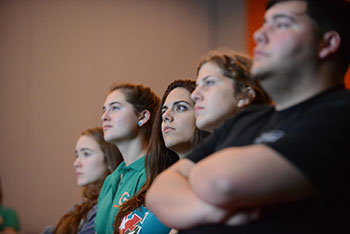Moments before boarding the Pan Am flight, her parents told her two things: take care of your sister and cousins she had in tow, and when you get to Miami, ask for a man named George.
It was September 6, 1961, and Eloisa M. Echazábal was just a child thrust into the role of adult. She was being sent away from her native Cuba, from her parents and family – all in the name of freedom. Unknowingly at the time, she was part of a group of children, some 14,000 strong, who were sent to the U.S. through Operation Pedro Pan, named for the fictional flying character Peter Pan.
The parents of these children, most from middle-class families and most between the ages of 12 and 15, didn’t want their children growing up under the oppressive rule of Fidel Castro. The U.S. government and the Catholic Welfare Bureau organized the secret exodus. Once stateside, some of the children united with relatives, but many ended up in group homes in Miami, Kendall and Florida City, and in orphanages near and far.
Echazábal did as her parents told her. She asked for George. And found him. He brought the children to Camp Kendall. The children played together with new friends. All was good. Except when nighttime came.
“It was at night when you really missed your parents,” Echazábal recalled. “It was at night when you would hear the children cry.”
Echazábal was invited to the University of Miami Tuesday night to talk about Operation Pedro Pan as part of “A Week of Cuban Culture” sponsored by the Federación de Estudiantes Cubanos (FEC), a nonprofit student organization that promotes Cuban culture at UM and in the community. She was joined by other survivors of Pedro Pan at the event, which was held in the Student Activities Center ballroom and attended by about 35 people.

Members of the Federación de Estudiantes Cubanos (FEC) listen to presentation in the Student Activities Center ballroom.
The event began with a 20-minute video slideshow narrated by Echazábal that showcased historical photos, and an overview of the changing social and political landscape in Cuba after the revolution, and the Pedro Pan operation. Parents made the decision to send their children away figuring the Castro regime wouldn’t last very long and Cuba would eventually return to normal. Some reunions occurred quickly. Others after years of separation. Some never saw their parents again.
Echazábal, her sister and cousins were bounced around from the group home to an orphanage in Buffalo, New York, to a foster home before returning to Miami, where she was reunited with her parents less than a year later.
She credits her parents for making the difficult decision of putting her and her sister on the Pan Am flight to escape Castro and his authoritarian rule. If she hadn’t boarded the plane, she said, “who knows where I would be today.”
Gladys Gomez-Rossie didn’t see her parents for 17 years. After leaving Havana in October 1961, she eventually made her way to New York, where she lived with her aunt.
Gomez-Rossie, community relations coordinator for the Cuban Heritage Collection at the UM Libraries and advisor of the FEC, told the group that the University’s Cuban collection has photos and letters related to Pedro Pan.
Armando Vizcaino of Miami first traveled to Jamaica, before ending up at Camp Kendall, and then a group home in Miami. After the failed Bay of Pigs invasion in April 1961, he said, the camps started to fill up and resemble true refugee camps. By early 1962, more camps were opened to handle the increasing numbers of children.
Fernando Hernandez of Miami said he left Cuba when he was nine, landing in Miami and spending time in New York. He’s grateful for the choice his parents made.
“It’s very important for us to thank our parents,” he said, “because we live in a free country.”
Peter E. Howard can be reached at 305-284-8085.
- Accessibility Options:
- Skip to Content
- Skip to Search
- Skip to footer
- Office of Disability Services
- Request Assistance
- 305-284-2374
- Display:
- Default
- High Contrast
- Accessibility Options:
- Skip to Content
- Skip to Search
- Skip to footer
- Office of Disability Services
- Request Assistance
- 305-284-2374
- Display:
- Default
- High Contrast
- Apply
- About UM
- Give to UM
-
Schools
- School of Architecture
- College of Arts and Sciences
- Miami Herbert Business School
- School of Communication
- School of Education and Human Development
- College of Engineering
- School of Law
- Rosenstiel School of Marine, Atmospheric, and Earth Science
- Miller School of Medicine
- Frost School of Music
- School of Nursing and Health Studies
- The Graduate School
- Division of Continuing and International Education
- Alumni
Operation Pedro Pan: No Fantasy of Flight

By UM News
University of Miami
- Coral Gables, FL 33124
- 305-284-2211 305-284-2211
UM Network
Tools and Resources
Copyright: 2025 University of Miami. All Rights Reserved.
Emergency Information
Privacy Statement & Legal Notices
Title IX & Gender Equity
Website Feedback
Individuals with disabilities who experience any technology-based barriers accessing University websites can submit details to our online form.
